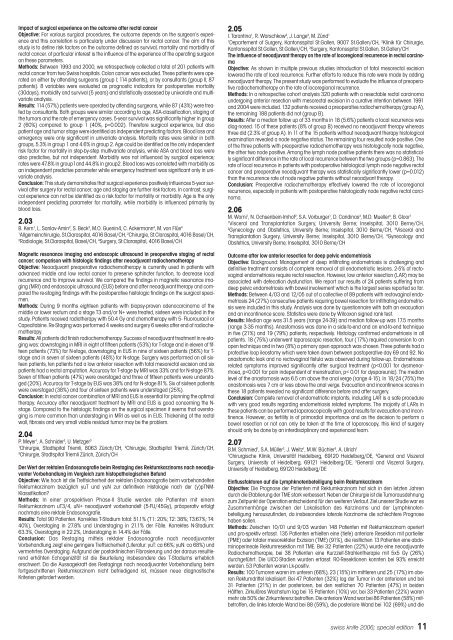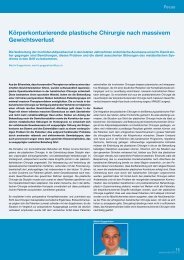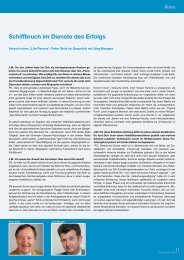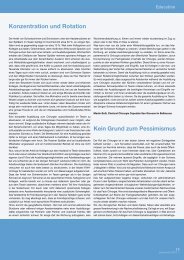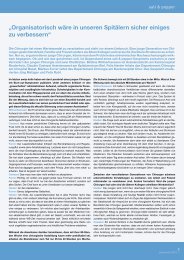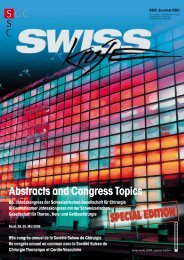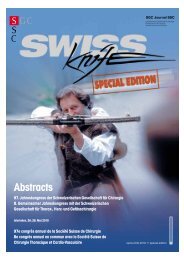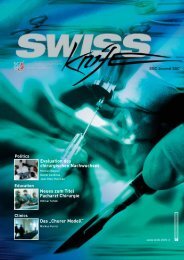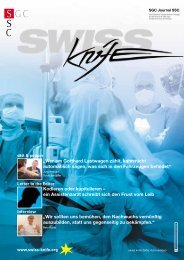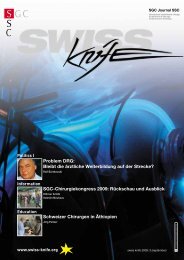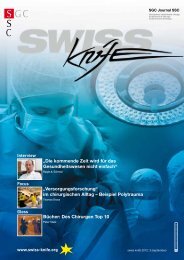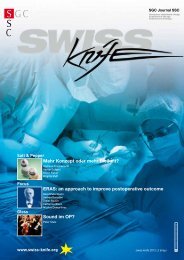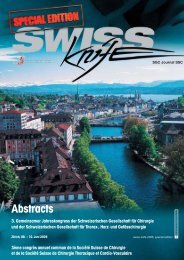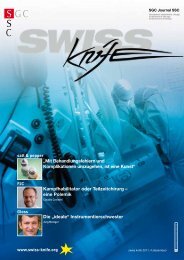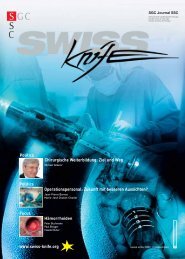Abstracts 4. Gemeinsamer Jahreskongress der ... - SWISS KNIFE
Abstracts 4. Gemeinsamer Jahreskongress der ... - SWISS KNIFE
Abstracts 4. Gemeinsamer Jahreskongress der ... - SWISS KNIFE
Create successful ePaper yourself
Turn your PDF publications into a flip-book with our unique Google optimized e-Paper software.
swissknife spezial 06 12.06.2006 13:39 Uhr Seite 11<br />
Impact of surgical experience on the outcome after rectal cancer<br />
Objective: For various surgical procedures, the outcome depends on the surgeon’s experience<br />
and this correlation is particularly un<strong>der</strong> discussion for rectal cancer. The aim of this<br />
study is to define risk factors on the outcome defined as survival, mortality and morbidity of<br />
rectal cancer. of particular interest is the influence of the experience of the operating surgeon<br />
on these parameters.<br />
Methods: Between 1993 and 2000, we retrospectively collected a total of 201 patients with<br />
rectal cancer from two Swiss hospitals. Colon cancer was excluded. These patients were operated<br />
on either by attending surgeons (group I; 114 patients), or by consultants (group II; 87<br />
patients). 8 variables were evaluated as prognostic indicators for postoperative mortality<br />
(30days), morbidity and survival (5 years) and statistically assessed by univariate and multivariate<br />
analysis.<br />
Results: 114 (57%) patients were operated by attending surgeons, while 87 (43%) were treated<br />
by consultants. Both groups were similar according to age, ASA-classification, staging of<br />
the tumors and the rate of emergency cases. 5-year survival was significantly higher in group<br />
2 (60%) compared to group 1 (40%, p=0.002). Therefore surgical experience, but also<br />
patient age and tumor stage were identified as independent predicting factors. Blood loss and<br />
emergency were only significant in univariate analysis. Mortality rates were similar in both<br />
groups, 5.3% in group 1 and <strong>4.</strong>6% in group 2. Age could be identified as the only independent<br />
risk factor for mortality in step-by-step multivariate analysis, while ASA and blood loss were<br />
also predictive, but not independent. Morbidity was not influenced by surgical experience;<br />
rates were 47.8% in group1and 4<strong>4.</strong>8% in group2. Blood loss was correlated with morbidity as<br />
an independent predictive parameter while emergency treatment was significant only in univariate<br />
analysis.<br />
Conclusion: This study demonstrates that surgical experience positively influences 5-year survival<br />
after surgery for rectal cancer; age and staging are further risk factors. In contrast, surgical<br />
experience can not be identified as a risk factor for mortality or morbidity. Age is the only<br />
independent predicting parameter for mortality, while morbidity is influenced primarily by<br />
blood loss.<br />
2.03<br />
B. Kern 1 , L. Sanlav-Amin 2 , S. Beck 3 , M.O. Guenin4, C. Ackermann 4 , M. von Flüe 4<br />
1 Allgemeinchirurgie, St.Claraspital, 4016 Basel/CH, 2 Chirurgie, St.Claraspital, 4016 Basel/CH,<br />
3 Radiologie, St.Claraspital, Basel/CH, 4 Surgery, St.Claraspital, 4016 Basel/CH<br />
Magnetic resonance imaging and endoscopic ultrasound in preoperative staging of rectal<br />
cancer: comparison with histologic findings after neoadjuvant radiochemotherapy<br />
Objective: Neoadjuvant preoperative radiochemotherapy is currently used in patients with<br />
advanced middle and low rectal cancer to preserve sphincter function, to decrease local<br />
recurrence and to improve survival. We compared the findings in magnetic resonance imaging<br />
(MRI) and endoscopic ultrasound (EUS) before and after neoadjuvant therapy and compared<br />
the re-staging findings with the postoperative histologic findings on the surgical specimen.<br />
Methods: During 9 months eighteen patients with biopsy-proven adenocarcinoma of the<br />
middle or lower rectum and a stage T3 and/or N+ were treated, sixteen were included in the<br />
study. Patients received radiotherapy with 50.4 Gy and chemotherapy with 5- Fluorouracil or<br />
Capecitabine. Re-Staging was performed 4 weeks and surgery 6 weeks after end of radiochemotherapy.<br />
Results: All patients did finish radiochemotherapy. Success of neoadjuvant treatment in re-staging<br />
was: downstaging in MRI in eight of fifteen patients (53%) for T-stage and in eleven of fifteen<br />
patients (73%) for N-stage, downstaging in EUS in nine of sixteen patients (56%) for Tstage<br />
and in seven of sixteen patients (48%) for N-stage. Surgery was performed on all sixteen<br />
patients, ten patients had a low anterior resection with total mesorectal excision and six<br />
patients had a rectal amputation. Accuracy for T-stage by MRI was 33% and for N-stage 87%.<br />
Seven of fifteen patients (47%) were overstaged and three of fifteen patients were un<strong>der</strong>staged<br />
(20%). Accuracy for T-stage by EUS was 38% and for N-stage 81%. Six of sixteen patients<br />
were overstaged (38%) and four of sixteen patients were un<strong>der</strong>staged (25%).<br />
Conclusion: In rectal cancer combination of MRI and EUS is essential for planning the optimal<br />
therapy. Accuracy after neoadjuvant treatment by MRI and EUS is good concerning the Nstage.<br />
Compared to the histologic findings on the surgical specimen it seems that overstaging<br />
is more common than un<strong>der</strong>staging in MRI as well as in EUS. Thickening of the rectal<br />
wall, fibrosis and very small viable residual tumor may be the problem.<br />
2.04<br />
P. Meyer 1 , A. Schni<strong>der</strong> 2 , U. Metzger 3<br />
1 Chirurgie, Stadtspital Triemli, 8063 Zürich/CH, 2 Chirurgie, Stadtspital Triemli, Zürich/CH,<br />
3 Chirurgie, Stadtspital Triemli Zürich, Zürich/CH<br />
Der Wert <strong>der</strong> rektalen Endosonografie beim Restaging des Rektumkarzinoms nach neoadjuvanter<br />
Vorbehandlung im Vergleich zum histopathologischen Befund<br />
Objective: Wie hoch ist die Treffsicherheit <strong>der</strong> rektalen Endosonografie beim vorbehandelten<br />
Rektumkarzinom bezüglich yuT und yuN zur definitiven Histologie nach <strong>der</strong> (y)pTNM-<br />
Klassifikation?<br />
Methods: In einer prospektiven Phase-II Studie werden alle Patienten mit einem<br />
Rektumkarzinom uT3/4, uN+ neoadjuvant vorbehandelt (5-FU/45Gy), präoperativ erfolgt<br />
nochmals eine rektale Endosonografie.<br />
Results: Total 90 Patienten. Korrektes T-Stadium total: 51.1% (T1: 20%; T2: 38%; T3:67%; T4:<br />
40%), Overstaging in 27.8% und Un<strong>der</strong>staging in 21.1% <strong>der</strong> Fälle. Korrektes N-Stadium:<br />
63.3%, Overstaging in 22.2%, Un<strong>der</strong>staging in 1<strong>4.</strong>4% <strong>der</strong> Fälle.<br />
Conclusion: Das Restaging mittels rektaler Endosonografie nach neoadjuvanter<br />
Vorbehandlung zeigt eine geringere Treffsicherheit (Literatur: yuT: ca 66%; yuN: ca 68%) und<br />
vermehrtes Overstaging. Aufgrund <strong>der</strong> postaktinischen Fibrosierung und <strong>der</strong> daraus resultierend<br />
erhöhten Echogenizität ist die Beurteilung insbeson<strong>der</strong>e des T-Stadiums erheblich<br />
erschwert. Da die Aussagekraft des Restagings nach neoadjuvanter Vorbehandlung beim<br />
fortgeschrittenen Rektumkarzinom nicht befriedigend ist, müssen neue diagnostische<br />
Kriterien gefor<strong>der</strong>t werden.<br />
2.05<br />
I. Tarantino1 , R. Warschkow2 , J. Lange3 , M. Zünd1 1 2 Departement of Surgery, Kantonsspital St.Gallen, 9007 St.Gallen/CH, Klinik für Chirurgie,<br />
Kantonsspital St.Gallen, St.Gallen/CH, 3Surgery, Kantonsspital St.Gallen, St.Gallen/CH<br />
The influence of neoadjuvant therapy on the rate of locoregional recurrence in rectal carcinoma<br />
Objective: As shown in multiple previous studies introduction of total mesorectal excision<br />
lowered the rate of local recurrence. Further efforts to reduce this rate were made by adding<br />
neoadjuvant therapy. The present study was performed to evaluate the influence of preoperative<br />
radiochemotherapy on the rate of locoregional recurrence.<br />
Methods: In a retrospective cohort analysis 320 patients with a resectable rectal carcinoma<br />
un<strong>der</strong>going anterior resection with mesorectal excision in a curative intention between 1991<br />
and 2004 were included. 132 patients received a preoperative radiochemotherapy (group A),<br />
the remaining 188 patients did not (group B).<br />
Results: After a median follow up of 33 months in 18 (5.6%) patients a local recurrence was<br />
diag-nosed. 15 of these patients (8% of group B) received no neoadjuvant therapy whereas<br />
three did (2.3% of group A). In 11 of the 15 patients without neoadjuvant therapy histological<br />
examination revealed a node negative status. The remaining four resulted node positive. One<br />
of the three patients with preoperative radiochemotherapy was histologically node negative,<br />
the other two node positive. Among the lymph node positive patients there was no statistically<br />
significant difference in the rate of local recurrence between the two groups (p=0.863). The<br />
rate of local recurrence in patients with postoperative histological lymph node negative rectal<br />
cancer and preoperative neoadjuvant therapy was statistically significantly lower (p=0.012)<br />
than the recurrence rate of node negative patients without neoadjvant therapy.<br />
Conclusion: Preoperative radiochemotherapy effectively lowered the rate of locoregional<br />
recurrence, especially in patients with postoperative histologically node negative rectal carcinoma.<br />
2.06<br />
M. Worni1 , N. Ochsenbein-Imhof2 , S.A. Vorburger1 , D. Candinas3 , M.D. Mueller4 , B. Gloor1 1Visceral and Transplantation Surgery, University Berne; Inselspital, 3010 Berne/CH,<br />
2 3 Gynecology and Obstetrics, University Berne; Inselspital, 3010 Berne/CH, Visceral and<br />
Transplantation Surgery, University Berne; Inselspital, 3010 Berne/CH, 4Gynecology and<br />
Obstetrics, University Berne; Inselspital, 3010 Berne/CH<br />
Outcome after low anterior resection for deep pelvic endometriosis<br />
Objective: Background: Management of deep infiltrating endometriosis is challenging and<br />
definitive treatment consists of complete removal of all endometriotic lesions. 2-5% of rectovaginal<br />
endometriosis require rectal resection. However, low anterior resection (LAR) may be<br />
associated with defecation dysfunction. We report our results of 24 patients suffering from<br />
deep pelvic endometriosis with bowel involvement which is the largest series reported so far.<br />
Methods: Between 4/03 and 12/05 out of a collective of 89 patients with rectovaginal endometriosis<br />
24 (27%) consecutive patients requiring bowel resection for infiltrating endometriosis<br />
were included in this study. Analysis was done by questionnaire with both an evacuation<br />
and an incontinence score. Statistics were done by Wilcoxon signed rank test.<br />
Results: Median age was 31.5 years (range 24-39) and median follow-up was 17.5 months<br />
(range 3-35 months). Anastomosis was done in a side-to-end and an end-to-end technique<br />
in five (21%) and 19 (79%) patients, respectively. Histology confirmed endometriosis in all<br />
patients. 18 (75%) un<strong>der</strong>went laparoscopic resection, four (17%) required conversion to an<br />
open technique and in two (8%) a primary open approach was chosen. Three patients had a<br />
protective loop ileostomy which were taken down between postoperative day 69 and 92. No<br />
anastomotic leak and no rectovaginal fistula was observed during follow-up. Endometriosis<br />
related symptoms improved significantly after surgical treatment (p


